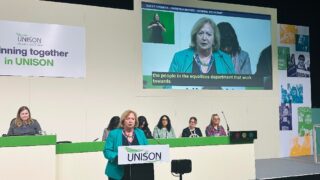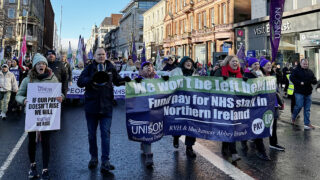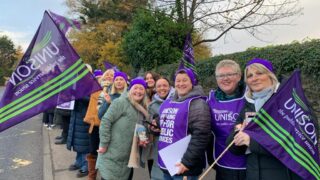There’s not long to go to the big election day on 5 May.
And that means that there’s not long for you to decide to vote to protect public services and our members who work in them.
There are opportunities to vote across the country, with elections for the Scottish Parliament, Welsh Assembly, Northern Ireland Assembly, 124 English councils, mayors in Bristol, Liverpool, London and Salford, and for police and crime commissioners in England and Wales.
In Northern Ireland, Scotland and Wales, UNISON has published its own manifesto, highlighting the issues that we believe are important for the union and our members.
These are the issues UNISON is campaigning on, and the issues the union is challenging candidates from each of the political parties on.
In Wales
As the UNISON manifesto in Wales says: “Public services are the bedrock of our communities: your local hospital, your local council services, your local school, college and police …
“Together, we can challenge the candidates in every Assembly seat to invest in the strong public services we need.
“Investment in these services will help tackle poverty and inequality and make Wales a fairer place to live.”
Launching the manifesto at the Senedd building in Cardiff in early March, Cymru/Wales regional secretary Margaret Thomas said: “We want world-class public services that Wales can be proud of.
“That means sustained investment, services retained within the public sector and provided by directly employed public sector staff.
“We know that the UK Conservative government is recklessly slashing spending because it doesn’t believe in the public sector, but a Welsh government must work as hard as it possibly can to protect our services.”
In Scotland
Scotland launched its manifesto – Public services and the good society – in early April, following specialist manifestos covering policing, early years learning and childcare, health inequalities, social care, local government funding and climate change.
The union reminded members and activists that “Scottish Parliament decisions impact on those who use public services and those who deliver them.
“Whether it’s investment in local government and public services, public sector reform, procurement, welfare spending, taxes, and how we deal with austerity in Scotland, all are crucial to all our lives.
“It is vital that UNISON members influence the debate.”
The manifesto says that investing in public services is essential if we are to build a sustainable economy and a decent society.
Scotland needs well funded, properly staffed, publicly run, accountable and responsive public services, says the union, and securing them is UNISON’s priority.
The manifesto makes it clear that the union believes this should also be the priority of anyone hoping to be the Scottish government.
“We want to see a Parliament using the powers at its disposal in order to enhance our public services – to create a fairer and sustainable Scotland,” declares the foreword from UNISON Scotland convenor Lilian Macer and regional secretary Mike Kirby.
UNISON is calling for
- an immediate end to the council tax freeze, a reformed progressive property tax and councils should be able to raise more of its own funding;
- properly funded procurement policies so the third sector is not viewed as a cheap alternative to health and local government funding;
- an end to cutting the support for learning and administration in schools which simply places burdens on other staff;
- a balanced police workforce and an end to the arbitary political pledge on police numbers, which has seen officers replace police staff in their jobs;
- water to remain publicly owned to stop the gradual privatisation of the service;
- policies and procedures to strengthen the voice of service users and staff in the design of health services.
Launching the manifesto, Ms Macer said: “Public services are an expression of all that is good: whether that is the joint decision making, expression of a community, solidarity between people and generations, or the idea that we all have a mutual obligation towards each other.
“Public services are not optional – they are essential to a civilised society.
“They hold our society together and make our lives healthier safer, cleaner, more secure and fun.
“If we believe in a more equal society, we must invest in public services and those who deliver them.”
In Northern Ireland
In Northern Ireland, the union has published a manifesto that tells candidates from across the political spectrum and all traditions: “We are not prepared to accept the sustained attack on public services and on the pay and conditions of our members who provide them.
“We are not prepared to accept growing poverty and inequality. We seek endorsement from parties and candidates on these issues and will publish responses to our membership.”
In particular, it notes that UNISON has “lobbied government and parties, and our members have taken to the streets in public protest over the failure of our elected politicians to work collaboratively in the best interests of the people, thus precipitating political crisis.
“In this election we seek clear commitments from all candidates, irrespective of party, that they will work together to produce the cross-cutting policies, strategies and outcomes required to improve the social and economic position of all people in Northern Ireland.”
The union spells out specific demands and poses key questions to the various parties and candidates standing in the election in a number of major areas covering:
- a commitment to work together in government;
- “the health and well-being of the people”;
- a radical reform of health and social care structure, which the union says is “not fit for purpose and cannot deliver performance, standards of care, financial stability or address inequalities”;
- education, which has lost £300m funding;
- workers’ rights, including a real living wage, protection for transferred workers, gender pay equality, jobs and investment, childcare and an end to employment discrimination;
- equality and human rights, including a Northern Ireland Bill of Rights, dealing with the legacy of Northern Ireland’s past and legislating for a woman’s right to choose.
In England
In addition to elections for the Scottish Parliament, the Welsh Assembly and Northern Ireland Assembly, there are also important electoral contests taking place across England on 5 May.
These include the elections for police and crime commissioners (England and Wales) a number of local councils and mayoral contests in London, Bristol, Liverpool and Salford.
All of these elections are an important opportunity for UNISON members to send a message to the government about cuts to public services.
Depending on where you live, you could well have more than vote to help decide which party runs your local council services or city, and who serves as your police and crime commissioner or PCC.
This is the person who will lead your local police force for the next four years and set priorities.
In London, the mayor has responsibility for policing, transport and the overall strategy for affordable housing and economy.
Members in London will get three votes – for the person they want to be mayor, the person they want to represent them in the London Assembly and the political party they want to run the city.
The context of these elections will be stark.
Close to one million jobs have been cut from the public sector by the government since 2010 – and there are more to come. Within this total, the number working in local government has been reduced to the lowest level since records began and the number working for the police has been cut by 17%.
The services that we all rely upon are suffering, with fewer to care for the sick and vulnerable in our communities, a reduction in local services like libraries and leisure centres, and fewer support staff to make services work properly.
And our communities are becoming less safe. Following cuts to police funding, serious crime has risen over the last year. This includes sexual offences up by 36% and violent crime up by 27%.
Your votes for local councils and PCCs are an important chances to have your say on these cuts, made by the government at Westminster, and to speak up for well-funded public services and neighbourhood policing.
Let’s send out a clear signal on 5 May.





